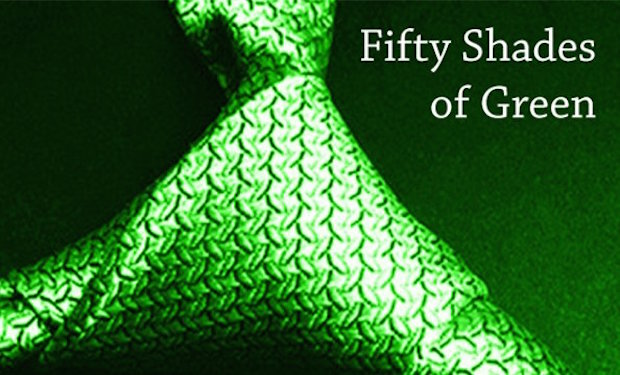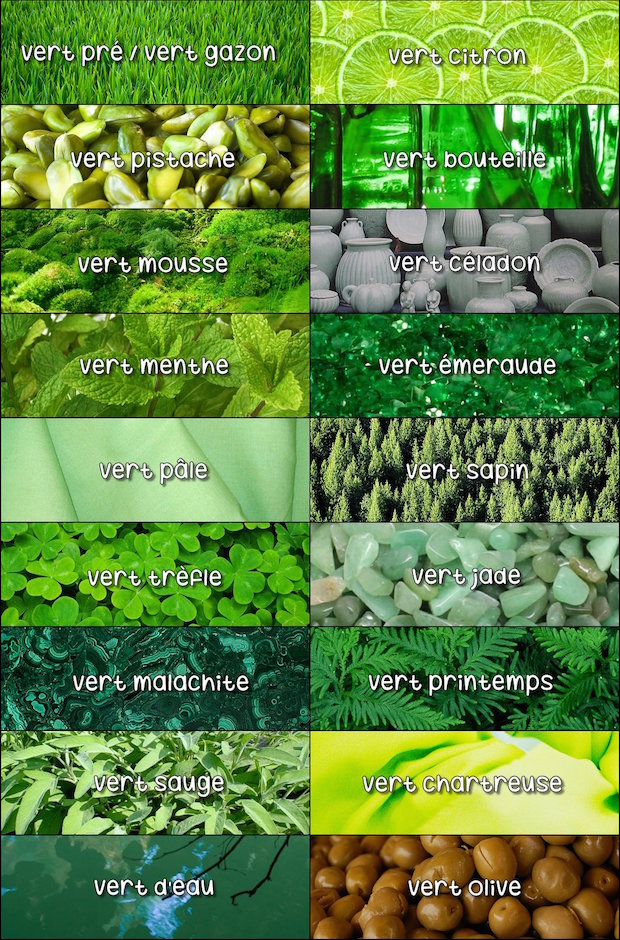Le printemps (spring) has officially sprung — La nature et vos allergies sont revenues à la vie (Nature and your allergies have come back to life). Flowers are blooming, bees are hard at work, and all that was brown has become green.
Le vert (green) is often associated l’argent et les finances (money and finances), l’avidité (greed), la jalousie (jealousy), l’ambition (ambition), la stabilité (stability), and la renaissance (rebirth).
Along with their many associations, colors play an important role in language. When you’re sad, you’re blue. You can be tickled pink. You can be in the red with the bank. If you’re scared, you’re yellow bellied.
To celebrate the return of Spring, we’re going to focus on the use of vert in French. En plus, c’est ma couleur préférée (plus, it’s my favorite color).

Image courtesy of Crafthubs
Noun
Let’s start with the word as a noun. Le vert means green, green light (in traffic), vegetation, and the countryside.
As a proper noun, les Verts is referring to The Greens, a green-ecologist political group that dissolved in 2010.
Have you ever had a penny that had a green spot on it? This is called le vert-de-gris, and it’s just a green tinge that forms on copper. The same thing can be found on The Statue of Liberty in New York.
Verb
“Vert” by itself isn’t a verb, but it’s used in some verbs.
Être au vert has 2 meanings. The first refers to being out in the country. The other is when you’re watching your diet. Both are referring to la verdure (the greenery) – either outside or on your plate.
Se mettre au vert also has 2 meanings. The first is to go out into the countryside for a relaxing rest. The other meaning is less literal: it means to go on the run (from the police, for example).
Mettre au vert without the reflexive pronoun is often presented in the past tense: mis au vert and means put out to pasture. The idea comes from the idea that once a horse is finished with a racing career, he’s put out to pasture (retired). This can be used for humans, though.
Couper en vert means to harvest a plant before it’s ready.
En voir des vertes et des pas mures is an expression that means someone has said something pretty spicy things to someone.
Être vert(e) de rage is used when you’re very, very mad. You can also simply just use vert. (Elle est verte!) Think of The Incredible Hulk, we say purple with rage in English.
Être vert(e) de peur means you are very scared. I think this is interesting because this idea is associated with yellow in English.
Être au temps de sa verte jesunesse and être encore vert(e) both refer to being in the bloom of your youth.
Donner le feu vert à quelque chose/quelqu’un means the same as it does in English: to give someone the green light to do something (to give permission)
Prendre quelqu’un sans vert means to catch somebody unaware.
Adjective
Le numéro vert is a toll-free number. These are nice because in France if you need to call your internet provider, for example, you are charged by the minute.
Thé vert is the same in English: green tea.
Un haricot vert is a green bean, un légume vert refers to a green vegetable in general, i is a green pepper, and un citron vert is a lime. Are you a successful gardener who can plant all these fruits and vegetables by yourself? You have i (a green thumb). In France, you have the green hand, but in Canada, you have le pouce vert.
50 Shades of Green
Despite the post’s title, I’m not going to give you 50 shades of green, but here are 19 different shades of green. Below the image, I’ve included the translations.

vert pré/vert gazon – grass green
vert citron – lime green
vert pistache – pistachio
vert bouteille – refers to the color of a standard green bottle
vert mousse – moss green
vert céladon – celadon green
vert methe – mint green
vert émeraude – emerald
vert pâle – pale green
vert sapin – pine green
vert trèfle – shamrock green
vert jade – jade
vert malachite – malachite green
vert printemps – spring green
vert sauge – sage green
vert chartreuse – chartreuse
vert d’eau – sea green
vert olive – olive green
vert caca d’oie – this isn’t in the graphic because nobody wants to see this. It literally means “goose poop green,” and is used to describe a color between yellow and green.

Blog submitted by: Alex at The French Property Network - Cle France.
This blog was originally posted on The French Language Blog pages.